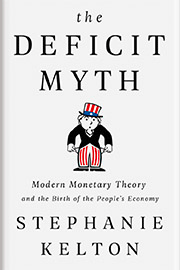
02/11/2020
Economist Stephanie Kelton, whose view of modern monetary theory helped lay the fiscal foundation for big policy proposals such as the Green New Deal, will bring her expertise to SUNY Cortland on Thursday, Feb. 20.
“The American dollar is a simple public monopoly,” Kelton observes of modern monetary theory in a CNBC interview. “In other words, the United States’ currency comes from the United States’ government.”
Which means, in her view, that governments may be able to safely practice more deficit spending than has been traditionally thought.
Kelton, who has served as chief economist of the U.S. Senate Budget Committee and as senior economic advisor to the presidential campaign of Senator Bernie Sanders, will talk about modern monetary theory and ambitious policy proposals from 5 to 6:30 p.m. in Sperry Center, Room 105.

The lecture continues the SUNY Cortland Cultural and Intellectual Climate Committee’s (CICC) year-long series on “Debt,” a concept that will explore a wide range of issues spanning criminal justice, inequality, immigration and climate change.
Events in the “Debt” series are free and open to the public. To view a list of upcoming topics, visit the CICC’s calendar.
Kelton, a professor of economics and public policy at Stony Brook University, is a founding fellow of the Sanders’ Institute, a progressive think tank founded by presidential candidate Bernie Sanders’ wife and stepson. She is the author of a new book, The Deficit Myth: Modern Monetary Theory and the Birth of a New Economy, which will be published this year by Public Affairs.
Kelton’s research focus includes Federal Reserve operations, fiscal policy, social security, international finance and employment policy.
The CICC’s “Debt” series will continue in Spring 2020 with the following events:
TALK CANCELLED/TO BE RESCHEDULED. TUESDAY, MARCH 10. David Fruend will lecture on the history of discriminatory lending practices in the U.S. and its role in perpetuating intergenerational inequality. Fruend, an associate professor of history at University of Maryland, will present from 5 to 6:30 p.m. in Brockway Hall Jacobus Lounge. A specialist in the history of the modern United States, Fruend is the author of the 2008 book, Colored Property: State Policy and White Racial Politics in Suburban America. The text was awarded the 2008 Ellis W. Hawley Prize from the Organization of American Historians, the 2007 Kenneth Jackson Book Award from the Urban History Association and the 2009 Urban Affairs Association Best Book Award. Fruend also has contributed to a number of public history, policy and documentary projects and has received grants and fellowships from organizations including the Woodrow Wilson International Center for Scholars and the Graham Foundation for the Arts.
WEDNESDAY, MARCH 11. Joelle Leclaire will discuss macro-financial stability and household debt from the perspectives of American Post-Keynesian Economics, the Cambridge approach, and the Monetary Circuit School. The Buffalo State College academic will share his ideas from 5 to 6:30 p.m. in Brockway Hall Jacobus Lounge.
TALK CANCELLED/TO BE RESCHEDULED. THURSDAY, MARCH 12. Scott Ferguson will focus on the politics of care and the aesthetics of money when he returns to visit the campus again from University of South Florida. He will speak from 5 to 6:30 p.m. in Brockway Hall Jacobus Lounge. Ferguson’s research explores relations between political economy and aesthetics, specializing in the history of Western visual culture from Renaissance painting to the Hollywood blockbuster. His book Declarations of Dependence: Money, Aesthetics and the Politics of Care was published by University of Nebraska Press in 2018. He serves as a research scholar for the Global Institute for Sustainable Prosperity, co-director of the Modern Money Network Humanities Division and co-host of the Money on the Left podcast.
THURSDAY, APRIL 9. Historical sociologist Jakob Feinig will address the topic of money creation from the perspective of popular knowledge and democratization as a means for delivering improved social outcomes. His presentation lasts from 5 to 6:30 p.m. in Brockway Hall Jacobus Lounge. Research by Feinig, who is on the faculty at Binghamton University, examines the intersection of money creation, electoral democracy and human rights. His work also looks at non-elite participation in North American money politics from the colonial period to the present. Feinig currently is writing a book titled The Moral Economy of Money, the first systematic long-term study of popular involvement in the monetary institutions of any country.
Featured Conversations in the Disciplines guests as well as Cortland faculty, staff and students are invited to contribute original works, which the committee plans to publish the collected works as a field guide under the Global Institute for Sustainable Prosperity’s ongoing book series under an agreement with publisher Palgrave-MacMillan. Last year, a field guide was published on the topic of Field Guide to Zombies and Surviving the Apocalypse. The institute is an independent public policy think-tank dedicated to the promotion of interdisciplinary research.
The “Debt” series programming is supported by a $5,000 grant from SUNY Conversations in the Disciplines, a program created to build connections between SUNY faculty and visiting faulty from non-SUNY institutions. The series is co-sponsored by the Provost and Vice President for Academic Affairs Office, the Campus Artist and Lecture Series, the Research and Sponsored Programs Office, the President’s Office and the Cortland College Foundation.
To submit an event, a Field Guide contribution, volunteer to support this year’s activities and programming, or for more information, contact organizer and Assistant Professor of Economics Benjamin Wilson at 607-753-2436. Stay current with the series news on Twitter at @SUNYCortCICC.
Prepared by communications office writing intern Victoria VanEvery